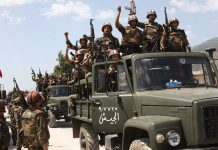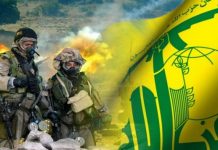Intervention averts execution of Lebanese Captive soldier by Al Nosra-ISIS
Hashem Osseiran| The Daily Star/Nov. 29, 2014
BEIRUT: The execution of a captive soldier being held on the Syrian border was averted Friday after General Security chief Maj. Gen. Abbas Ibrahim negotiated through mediators with Nusra Front jihadis to compel them to call off the killing, a source at General Security told The Daily Star.
And early Saturday, the Lebanese government issues a statement saying authorities were doing everything in their power to preserve the safety and the lives of the kidnapped soldiers and policemen.
The source said that after Ibrahim intervened, the Nusra Front went back on its threat issued Thursday to execute soldier Ali Bazzal within 24 hours if the government failed to release a female terror suspect.
Ibrahim contacted mediators who attempted to persuade the captors to keep Bazzal alive, the source said.
Bazzal’s wife, Rana Fliti, told The Daily Star in a phone interview that an Arsal Sheikh Mustafa Hujeiri had traveled to the outskirts of the town around 6:15 p.m. to meet with the captors in an attempt to save his life.
Fliti slammed the government for not being responsive, saying that not a single member of the crisis cell tasked with overseeing the hostage case was responding to her calls, or updating her on the situation.
She expressed hope that her husband would return safely and said she had full confidence in Hujeiri.
The Nusra Front Friday reissued its threat to execute Bazzal. “Eight hours are left for the release of Joumana Hmeid before carrying out the death [sentence] against the captive Ali Bazzal,” a statement on a Nusra Twitter page read. The threat was posted around 3:30 p.m., meaning the deadline was around 11:30 p.m.
The statement came after Nusra threatened Thursday to execute one of the 26 Lebanese captives being held by jihadis on the northeast border unless Lebanon release Hmeid within 24 hours.
The statement said that if the government wanted to prove that it was willing to carry out serious negotiations then it should release Hmeid as a “goodwill gesture.”
Hmeid was formally charged by Military Prosecutor Saqr Saqr over involvement with Al-Qaeda-linked groups, after she was caught driving a car rigged with 50 kilograms of explosives on the Arsal-Labweh road last February.
Hmeid is the first woman to be accused of complicity with a terrorist organization since the spate of car bombs and suicide attacks targeted areas seen as sympathetic to Hezbollah over the past year and a half.
Earlier Friday, police used water canon to disperse families of hostages who had blocked a vital Beirut highway. The protest came a day after the Nusra Front gave the government 24 hours to release Hmeid.
Families have been blocking roads across the country since the servicemen were abducted in August during a battle with jihadis in the northeast border town of Arsal, but the protest Friday morning was the first time police used force to break one up.
Interior Minister Nouhad Machnouk appeared to support the police move, vowing not to let relatives of the 26 Lebanese hostages block any more roads. “We will not be the hostages of the captives’ whims,” Machnouk told a news conference.
“Roads will not be blocked after today because this is not the solution for the return of the servicemen,” he added. The families of the servicemen called for Machnouk’s resignation.
“If my resignation would free the hostages, I’m ready,” the interior minister said, while stressing that Prime Minister Tammam Salam and the government has spared no effort to resolve the hostage crisis.
Referring to the Islamist militants holding the hostages, Machnouk said that “these are criminal groups that want to intimidate the families by sending them instructions.”Health Minister Wael Abu Faour, however, urged security forces not to use violence. Abu Faour, who has maintained cordial relations with the families, acting as a liaison between them and a crisis cell tasked with following up on the hostage crisis, slammed what he called an excessive use of force.
Around 8 a.m., the protesters faced off against dozens of policemen before they were able to form a human chain to block Charles Helou Highway, which leads from Karantina into Downtown Beirut, in both directions.
“The assault that the families of captives were subject to today is shameful to the state,” Abu Faour said, insisting that the protesters were set to reopen roads on their own before the scuffle. “It’s a demonstration of brute and failed force [used] in the wrong place,” he added.
Abu Faour also said that he hoped such a force was used to liberate the captives rather than in a “pseudo heroic [action] against the families.”
But later in the day, the families returned to the highway and blocked it again after the Nusra Front reissued the threat to execute Bazzal in a tweet.
The captors routinely call the families and order them to block certain roads and hold demonstrations, often threatening to kill the hostages if they fail to comply. Machnouk urged the hostage families to ignore the kidnappers “who intend to destroy the country, block roads and disrupt peoples’ businesses.”
MP Walid Jumblatt criticized the attack, saying in a tweet: “Those people [protesters] have nothing but the shirts on their backs, while others block roads with real and fake motorcades,” in reference to politicians who have barricades set up around their homes and official buildings for security, causing traffic nightmares for many





















